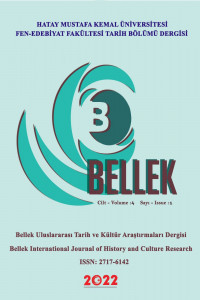SÂLİH ÇELEBİ’NİN CEVÂMİ’Ü’L-HİKÂYÂT VE LEVÂMİ’Ü’R-RİVÂYÂT TERCÜMESİNİN KAYNAKLARI ÜZERİNE
ÖZET
Klasik Türk edebiyatının mensur sahası içerisinde önemli bir yer tutan mensur eserler toplum içerisinde gerek sözlü gerekse yazılı bir şekilde anlatılarak nesilden nesile aktarılmıştır. Bu tarz hikâye külliyatları zaman zaman ahlakî, sosyal, siyasî mesajlar verirken zaman zaman kahramanlık, aşk, serüven, yolculuk gibi konularla okuyucu ve dinleyicilerin daha iyi bir vakit geçirmesini sağlamıştır. Kendi dönemi içerisinde oldukça önemli bir yere sahip olan Cevâmi’ü’l-hikâyât, barındırdığı hikâyelerle hem kendi dönemindeki hikâye geleneğine hem de kendinden sonraki geleneğe kaynaklık etmiştir.
Muhammed Avfî tarafından Farsça kaleme alınan Cevâmi’ü’l-hikâyât ve Levâmi’ü’r-rivâyât, çeşitli kaynaklardan derlenmiş tarihî, dinî, siyasî, sosyal, ahlakî, mitolojik ve daha çok farklı konudaki hikâyelerden oluşmaktadır. Eser, yirmi beş bölümden oluşan dört kısma ayrılmış olup her bölüm farklı konulardan oluşmaktadır. Yazılı kaynaklarda ifade edilen bilgilere göre Cevâmi’ü’l-hikâyât’ın üç adet tercümesi mevcuttur. Bu tercümeler içerisinde en kâmil olanı 16. yüzyılın önemli devlet adamlarından Celâl-zâde Sâlih Çelebi’ye aittir. Çevirisi 15 ay gibi kısa bir sürede tamamlanan tercümede iki bine yakın hikâye olduğu tespit edilmiştir. Sâlih Çelebi’nin bu tercümesinde Emevî ve Abbâsî halifelerinin hikâyeleri, İran’ın mitolojik hükümdarlarının hikâyeleri, İslam tarihi için önem arz eden önemli kişiliklerin yaşamlarından kesitler sunmaktadır.
Bu çalışmada Sâlih Çelebi tarafından tercüme edilen Cevâmi’ü’l-hikâyât’ın derlenirken faydalanılan kaynakların tespiti ve bu kaynakların esere olan katkısı incelenmeye çalışılmıştır. Sâlih Çelebi, Avfî’den yaptığı tercümenin orijinaline sâdık kalmış ve Avfî’nin hikâye/ler alıntıladığı eserleri zikretmeye gayret etmiştir.
Anahtar Kelimeler: Hikâye, Avfî, Sâlih Çelebi, Tercüme, 16. Yüzyıl
Anahtar Kelimeler:
salih çelebi, avfi, 16. yüzyıl, hikaye, tercüme
CEVÂMİ’Ü’L-HİKÂYÂT VE LEVÂMİ’Ü’R-RİVÂYÂT BY SÂLİH ÇELEBİ ON THE SOURCES OF HİS TRANSLATİON
EXTENDED SUMMARY
In the dictionary, to tell, to convey, to repeat, imitate, imitate the word story is also used as a noun. Experienced or the story, which is a form of expression that tells about the events that can be experienced, is one of the most popular in the Turkish literature. İn broad terms, it was thought of as the narration of an event whether in verse or in prose history, tale, legend, joke, epic, legend, describing an event. On the basis of arbitration all works based on stories are generally named with the name of the story.
Cevâmi’ü’l-hikâyât ve Levâmi’ü’-rivâyât, written in Persian by Muhammed Avfî, consist of stories on historical, religious, moral, mythological and many different subject compiled from various sources. The work is divided into four parts consisting of twenty-five chapters and each chapter consists of different subjects. According to the written sources, there are three translations of Cevâmi’ü’l-hikâyât. Which has a very important olace in its own period, has been a source both for the story tradition of its own period and for the following periods with the stories it contains.
The most perfect one among these translations belongs to Celâl-zâde Sâlih Çelebi, one of the imprtant statesmen of the 16th century. It has been determined that there are nearly two thousand stories in the translation, which was completed in a short period of 15 months. In this translation of Sâlih Çelebi, the stories of the Umayyad and Abbasid caliphs, the stories of the mythological rulers of Iran, and the lives of important personalities who are important for the history of Islam.
In this study, it has been tried to determine the sources used in the compilation of Cevâmi'ü'l-hikâyât translated by Salih Çelebi and the contribution of these sources to the work. Salih Çelebi tried to stay faithful to the text by translating the work from Avfî and tried to mention the works that Avfî quoted from the story/s. The fact that Salih Çelebi mentions the works that Avfî mentioned during the translation appears as an indication that she wanted to follow a unique style.
Keywords: Story, Avfî, Sâlih Çelebi, translation, 16th century
Keywords:
Story, Avfî, Sâlih Çelebi, translation, 16th century,
___
- Aslantürk, Hümeyra, “Necmeddin Nesefî”, TDV İslam Ansiklopedisi, C. 3, İstanbul, ss.571-573.
- Aydın, Halis, Celâl-zâde Sâlih Çelebi’nin Kıssa-i Fîrûz Şâh Tercümesi (İnceleme-Tenkitli Metin), (Yayımlanmamış Doktora Tezi). Dumlupınar Üniversitesi, Lisansüstü Eğitim Enstitüsü, Türk Dili ve Edebiyatı Anabilim Dalı, Kütahya 2022
- Avcı, Casim, “Târihu Bağdâd”, TDV İslam Ansiklopedisi, C. 40, İstanbul, ss. 88-89.
- Bülbül, Tuncay, Mensur Bir Hikâye: Tarih-i Mısr-ı Cedîd, Dergah Yayınları, Ankara 2011.
- Bülbül, Tuncay, Cevâmi’ü’l-hikâyât ve Levâmi’ü’r-rivâyât Tercümesi, Tezmer Yayınları, Kayseri 2017.
- ISSN: 2717-6142
- Yayın Aralığı: Yılda 2 Sayı
- Başlangıç: 2019
- Yayıncı: Hatay Mustafa Kemal Üniversitesi
Sayıdaki Diğer Makaleler
SELÇUKLULARDA VEZİRLİK MÜESSESESİ
Durdu Mehmet BAYIR, Fatma Nur CİĞER
Şenay ATAM, Mehmet Şakir ULUDAĞ
OSMANLI DÖNEMİNDE MUSEVİ MATBAACILIĞININ TEMEL GELİŞİMİ
SÂLİH ÇELEBİ’NİN CEVÂMİ’Ü’L-HİKÂYÂT VE LEVÂMİ’Ü’R-RİVÂYÂT TERCÜMESİNİN KAYNAKLARI ÜZERİNE
DİVAN ŞİİRİNDE “İSTEMEZ” REDİFLİ ŞİİRLER VE BU ŞİİRLER ÜZERİNE BİR DEĞERLENDİRME
ABD’NİN OSMANLI TOPRAKLARINDA MİSYONERLİK FAALİYETLERİ VE ERMENİLER
I. DÜNYA SAVAŞI’NDA ÜSERA-YI İSLAMİYE; OSMANLI DEVLETİ’NİN MÜSLÜMAN ESİRLERE YAKLAŞIMI
